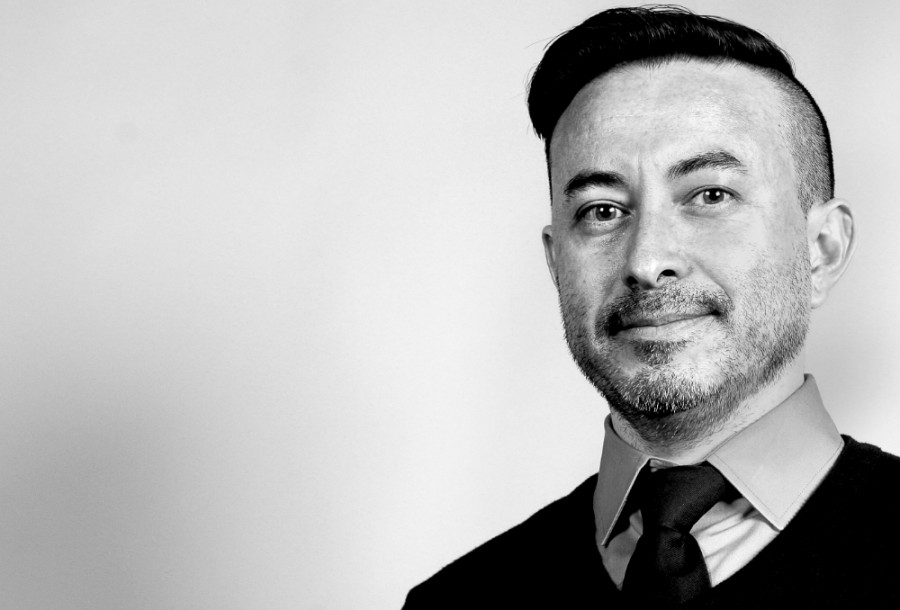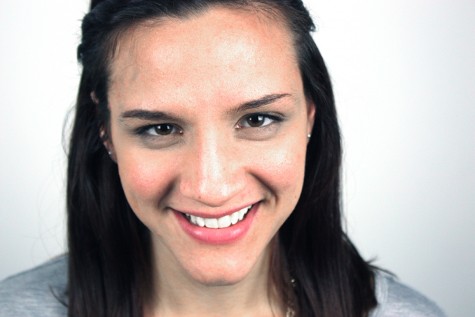Quesada named DEN Person of the Year
April 30, 2015
Ruben Quesada’s experience as the son of a Costa Rican immigrant woman was intensified in the classroom of an English instructor who immigrated from the Philippines and mastered her second language well enough to teach it for decades.
This was the first time Quesada, an English professor at Eastern, saw someone like him in an authoritative position.
“It’s about visibility, ultimately. It’s about having someone visible, having somebody available that was visible to show me that you don’t have to have it all to make it in this world,” he said. “You just have to be passionate about it. You just have to want it.”
The English professor’s calendar is almost always full with committee meetings, classes and time for travel. From morning to afternoon, Quesada’s schedule is neatly arranged and meticulously executed in a way that educates and enhances Eastern’s diverse community. That is why he has been chosen as The Daily Eastern News’ 2015 Person of the Year.
Stephanie Markham, news editor at The News, said Quesada’s tight schedule is precisely why the staff voted him as the 2014-15 school year’s most prominent person.
“We chose him because he’s involved in so many critical groups on campus,” Markham said.
Since his first year at Eastern in 2012, Quesada has accumulated an impressive list of responsibilities including but not limited to his roles as: English professor, 2015-16 EIU Pride adviser, founding member of Making Excellence Inclusive and a seat on the presidential search committee.
It seems everywhere Quesada finds himself, he promotes a lesson of diversity and inclusivity.
“Like any group that I get involved with, I think my role is to offer my perspective and how my experience intersects with the institutional experiences,” he said. “What is this institution like now and how does my personal experience either fit into the common experience here and how does it maybe challenge the experience here?”
During his time on the presidential search committee, Quesada made a point of asking questions he knew would reveal the candidates’ experiences with diversity.
“My role in these committees is to ensure that we not only invite people into the Eastern community that have a global view of the world, but are also aware that the people on campus may or not be different than themselves,” he said.
Much of Quesada’s success and motivation is rooted in his personal experience and the personal experiences of those around him, although he struggles to place himself in a particular footing in the world.
“It’s really strange because I have a hard time kind of assessing my own sense of being in the world sometimes, and it might be because I’m always looking forward and I don’t take enough time to look back,” he said. “It’s important to reflect and maybe that’s what I do in my own poetry, and I do it in isolation and I’m hoping that comes across when I’m teaching.”
The professor has published three books of poetry and essays titled: “Latino Poetics: Essays on the Art of Poetry,” “Next Extinct Mammal” and “Exiled From the Throne of Night: Selected Translations of Luis Cernuda.” Most of his essays are derived from experiences he has lived and later explored through language.
To promote awareness about the importance of considering life as a series of unique and diverse perspectives, he began to incorporate technology into his lesson plans — starting with the use of Twitter.
He started using the social media platform during his time as a graduate student to have students put what they were learning in the classroom out into the world and become conscientious about using language in a public space — something Quesada knows well.
Quesada is vocal about aspects of his own personal experience other professors may not be, and does so in a way that is beneficial to his students, Markham said.
“What stands out to me about Quesada is that he is very open about being a queer person of color and how that affects his experience on campus,” Markham said. “And so him taking on these leadership roles is even more impactful because students who are minorities can look up to him.”
One message Quesada said he hopes he can get across to students is one he learned early on from his mother and again from his English teacher: a person’s success is not limited by their history, rather propelled by their motivation.
“She taught me that hard work and not giving up could get me almost anywhere. And my mother gave me the same advice,” he said. “Do well in school. Have big dreams and don’t give up — no matter what anybody says.”
Katie Smith can be reached at 581-2812 or [email protected]


















































